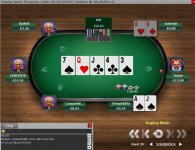Well, like everything it depends. If you don't have a lot of hands or info on your opponents, checking these kinds of flops from time to time is fine. A lot of players have bet when passed to disease, so opening up their bluffing range is good. Once you build history, and you're against competent opponents, that's more where balancing and game theory start to come into play. What do you want your hand range to be here when you check? I'm not going to get into that because at these stakes you should be focusing on exploitative play almost exclusively.
In this particular spot, if you think your opponent has a high potential of playing back, then betting is fine. Maybe even CR small to try and induce him to make an even bigger mistake. Reading the tension point of a player based on how the table is playing, and your dynamic is carrying out is an important and often overlooked aspect of the game. A simple example from someone I was coaching Tuesday.
He had a regular no 3 of his tables that was 3-betting him a ton. I think somewhere around 15%~. We were mixing in some 4-bets, calls and folds depending on the situation (so essentially my student was playing back at him a good bit). At one point I advised cold 4-betting against this opponent when he had position with I think something like A9o. Someone in the blinds cold called the 4bet and everyone folded. He ended up flopping A9 and stacking this guy, but the point is he showed down this hand against a decent reg who was likely paying attention.
Fast forward maybe 10 minutes later he picks up JJ UTG. Player in the CO calls, and this reg 3-bet squeezes on the button. Folds back to my student and he wanted to fold, and I said, no way... his range is going to super wide in this spot, but I think we were ~120 bbs deep. I told him to 4-bet/call. He 4-bet, reg on button 5 bet jammed. Student still wanted to fold.

He called, and button reg showed AJo and my student won the hand.
The point being that you want to stay cognizant of the tension dynamic that's building and adjust your ranges accordingly. Just make sure that you aren't leveling yourself or being set up. A common example of being setup and making a bad decision would be opening, getting 3-bet and folding two times in close number of hands. Then you get 3-bet a third time by the same opponent. Usually you're going to be looking at a real hand at this point, so unless your opponent is a maniac, you'll want to make sure you don't react at this point.
This is also a reason I advocate 4-bet bluffing right away in a session, otherwise if you have a good regular on you, they will tend to exploit you and you won't know when the adjustments are being made. And I mean 4-bet bluffing at small stakes+. Not micro, unless you have a good reason to do so against an opponent.













